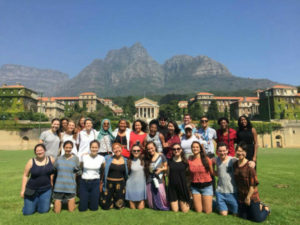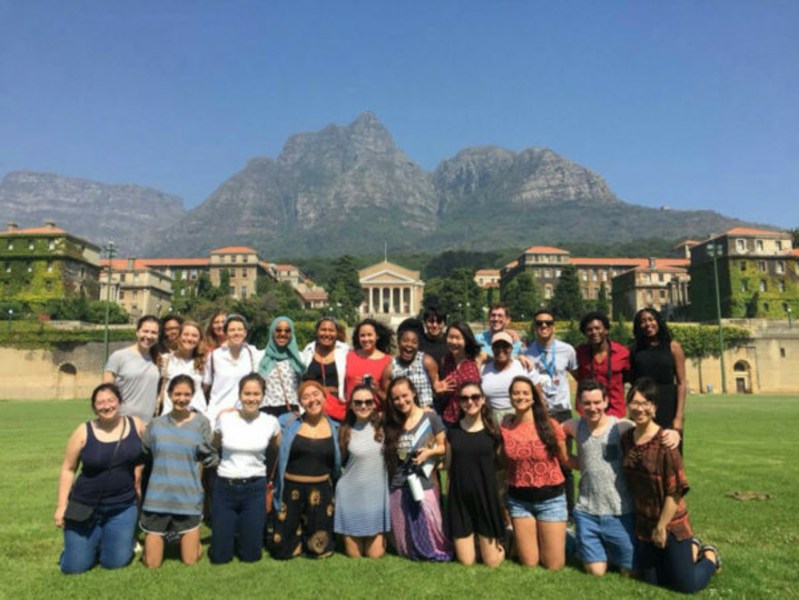The Bing Overseas Studies Program (BOSP) announced on Jan. 25 that the Cape Town program set for spring 2017-2018 has been suspended due to the city’s ongoing water crisis – officials fear Cape Town could run out of water entirely in April as a three-year drought persists.

Shawna Knauff, associate director of student and academic services at BOSP, sent an email to students enrolled in the program informing them of the decision Thursday evening, citing “substantial concerns about student health and safety.”
In response to what Knauff referred to as “insufficient rainfall and rapidly declining dam levels,” Cape Town city officials recently announced increased restrictions on water use, effective Feb. 1. The restrictions will limit each resident to 50 liters of water per day over a period of at least five months. Water will be rationed in Cape Town for an “indefinite period,” according to Knauff’s email.
Knauff added that Cape Town city officials speculate the city’s water supply will be shut off completely on April 12, a date that falls during the start of Stanford’s spring quarter. If the city’s taps are turned off, residents will not have access to running water. Instead, they will be required to travel to collection points in the city to receive a maximum of 25 liters of water per day. Knauff referred to April 12 as “Day Zero.”
“As we approach Day Zero, the water crisis has the potential to lead to social unrest,” Knauff wrote. “We also could not guarantee that our students would have adequate water for personal use and drinking. And we do not want to contribute to the crisis by adding visitors at a time permanent residents are facing shortages of such a critical resource.”
Although the 22 Stanford students currently in Cape Town for the winter quarter program will continue their studies, Knauff wrote, Stanford is monitoring the water shortage for potential impacts on students as well as the role of students in potentially diminishing the scarce resource. Cape Town residents are currently facing long lines at water collection points and obstacles to day-to-day activities such as cooking and showering.
The 27 students who planned to take part in the spring quarter program will no longer be able to participate. One student, Ben Gaiarin ’19 wrote in a message to The Daily that he believes BOSP’s decision to cancel the spring Cape Town program was a responsible move.
“The priority here should be the safety of the residents of Cape Town,” Gaiarin wrote. “If we were to continue with our program as planned, we would exacerbate the crisis by taking some much-needed water from the people of Cape Town. I think Stanford should strongly consider canceling the winter quarter program as well if the crisis continues to worsen.”
Knauff sent the initial announcement of BOSP’s decision to various campus administrators Thursday afternoon. Later in the day, the students preparing for the spring Cape Town program were informed of the decision in a separate email, which also included a list of alternatives available to the students.
In the email to would-be spring participants, Knauff noted that the students will receive guaranteed placement in the summer Cape Town program if it is not also cancelled. She added that BOSP will work with the students to cancel or change any plane tickets they already purchased. If they choose, the students will be allowed to remain in their respective residences on campus during spring quarter.
“We understand this decision will have a profound impact on your plans for Spring Quarter and will be met with disappointment,” Knauff wrote. “We are committed to providing information about alternative options and support to you as you make decisions about next steps.”
Since Stanford’s international relations (IR) major requires students to study abroad, cancellation of the Cape Town program could cause problems for would-be spring participants studying IR. Knauff wrote in the email to the students that they can still enroll in three of BOSP’s spring quarter programs — Paris, Santiago and Berlin — which are accepting students on a waitlist. Each of the three programs has a language prerequisite, but Knauff wrote that BOSP will make arrangements for students to take language placement tests if necessary.
Juliana Chang ’19, who originally planned to study in Cape Town in the spring, told The Daily that she is disappointed but understands the circumstances.
“I turned down another study abroad offer for Cape Town, and now I won’t be going anywhere, and it sucks,” Chang wrote in an email. “I get why the program was canceled, and I agree completely that we shouldn’t be straining Cape Town’s resources when there’s a crisis, but of course I’m really bummed.”
BOSP is still accepting applications for the Cape Town program in summer quarter. Additionally, a Bing Overseas Seminar, titled “Soccer and Rugby in South Africa: A Racial Divide and Future Transformation,” is still scheduled to take place in Cape Town from June 24 to July 14.
BOSP will re-evaluate whether or not to cancel these Cape Town summer programs at the end of February, Knauff wrote.
Sarah Wishingrad contributed to this report.
Contact Holden Foreman at hs4man21 ‘at’ stanford.edu.
